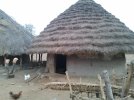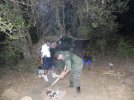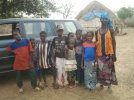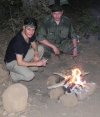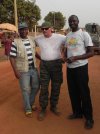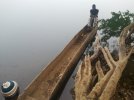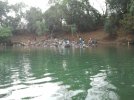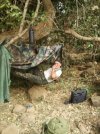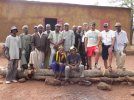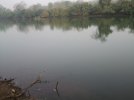I have been traveling around the world for 35 years now, I have been in Africa for years in some amazing places and in some less than amenable, the pic here is in the Guinean (Conakry) prospecting for gold on the Baffin river.........typical bush Hilton case. Mauritania is not that better but safer (medically included).
If I have to give my two cents I normally lay down my costs list when I plan a mission or a trip, things are not that different and sometime worth a Skype call to confirm some of the costs and assumptions without incurring huge international calls bills.
My costs and check list is as follows:
Personal Equipment:
-Clothing & shoes (get some military surplus, they are cheap and very likely of the best quality to stand abuses), don't forget head covers and bandanas. Confirm if there is a laundry service and plan for a change a day if possible or alternatively less frequently and avoid cotton it keeps body odors like hell, still plan one change a day for the underwear. On a note in the bush I use the old military shorts type of underwear, more comfy and a lot easy to maintain than modern types. Good sun bath helps to "dry clean" items not worn. Wool socks, thick or thin they work well in both cold and hot climate. If you haven't gone through the experience of serving in the army, it is a good idea to break your boots before going, "ruck sack" blister are a real pest, however it helps when marching a lot by foot to wear a think pantyhose like material socks under the wool socks, I used them during deployment and never had blisters and believe me in the early 80's army boots were nowhere near as sophisticated as they are today. If you are going for all leather boots, take a shower with them on and walk in them till they dry and they will fit to your foot like a glove.
- Opt for a good back pack (60-100 liters), for two week traveling it will be more than enough capacity to hold everything. Forget about expensive suitcases or other "Clark Gable" Mogambo's items. It is amazing how beaten up expensive suitcases get in Africa airport and anywhere else in the world. Here military surplus works fine and they are cheap.
-Plug/socket adapter (they sell them at the airport or at the luggage shops for few dollars, one unit serves all the requirements for international sockets).
- One personal hygiene pouch, again military style, easy bound, indestructible and can be hang from a hook (provided) anywhere.
- Phone: forget your roaming service, you want to end up with a hefty bill, start roaming, you are going to pay for every call from your country to where you are on international rates. Ask the outfitter to provide a local rechargeable chip at the airport or upon arrival, make sure it fits your phone (send out an sms with the new number including the international country code to your loved one). Get a cheap and sturdy phone, all these IPod, I Pad and the like are very prone to dust and breaking and in certain places are a real nuisance, you will discover the world as it was many years ago without mobile phone...........it will make your experience more unforgettable.
-Critter protection: invest few bucks in a clothing critter protection spray (Sawyer Permethrin based) spray all the clothing till they are wet all over and let them dry naturally, once treated it will last for 3-4 washings, more if the washing is only water.
If is sunny and you have the north Wisconsin type of skin, wear long sleeves.
Personal hygiene items (1 week):
Do not exceed and bring dental floss.
First Aid Items:
- Insect repellent in small gel vials (Picaidirin or DEET), Sawyer has a good line used by the military
- Tick remover or twizers for thorn
- Disinfecting pads
- Plasters of the heavy duty type
- Two elastic bandages (for snake bites first aid or for sprinkled ankles)
- Vials of ionic water solutions (they are small an in plastic for eye or small cut wash)
- Sun screen better in stick type
- One tactical bandage for a bit larger wounds (they are self disinfecting and in sealed packages)
Other items for bush comfort:
- Hydration salt tablet
- Water purification tablets
- One water filter 0.02 microns absolute porosity (130 $ but worth all the money) good up to a millions gallons without major maintenance very small in size
- One hydration bladder 3.5 liters
- One lattice small tubing
- One military poncho
- One military canteen with metal cup
- One fire starting rod
- One good knife with sharpening stone ( I cannot overemphasize this item)
- One roll of good duct tape (a million uses)
- One head lamp of good quality with spare batteries
- One pair of heavy leather gloves
- One small vial of vaseline
- One military hammock
- 100 feet of paracord
- A treated insect net single person
- One quart titanium cooking pot
I'm assuming an unforeseen overnight stop for those who do not like to sleep on the ground.
Others:
- One military belt or sturdy leather belt (this latter can also be used as a strop for the knife)
- One butt pack military style (all items above stays in the butt pack except the canteen)
Move light, starts and stay hydrated throughout the day.
So far total investment is, aside the knife and the filter not more than 500$ at the most and it will last for long time.
Everything else as far as accommodation is concerned should be included in the price, ask for extra beverages and spirits. Ask about supplies during hunting, water especially, any extra?
Tipping: a Skype call should clear the mood for a budget. The good thing about Africa is that there is always a solution.
Games price: the list should be clear about inclusions and exclusions. I don't see any problem with it.
Weapons: if you rent the rates should be clear; I would buy an extra box of ammo for practice if unfamiliar with the weapon
Bow Hunting: bow in a hard case, with arrows and accessories. Two spare strings, serving material, spare nocks, BH sharpening kit, spare glue for inserts and feathers, spare inserts........I'm a traditional so for compound hunter I leave it to you.
Camera: everything needed including spare films, charger, etc. I prefer a compact one if I bring it.
Check what is the average salary in the country, this will give you an idea how much local currency to exchange for taxi and other amenities if you need them. Negotiate.
Taxidermy: this for me is a luxury I have seen some good ideas in the posts.
In conclusion I hop to have given some useful tips, these have worked well for me in countries like the one in the pics below (Guinea) , my experience is Africa is that extra luxury comes at high price, reasonable treatment come cheaper; after all is common sense anywhere where logistic is an issue, extras come at a high price and don't forget to smell the roses, your PH is going to give you the experience of a lifetime.





















